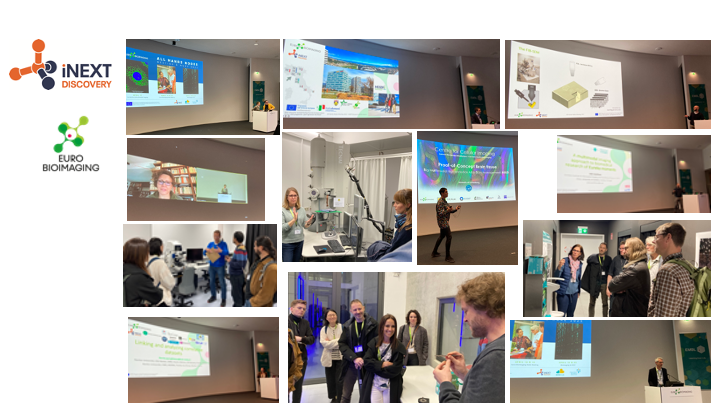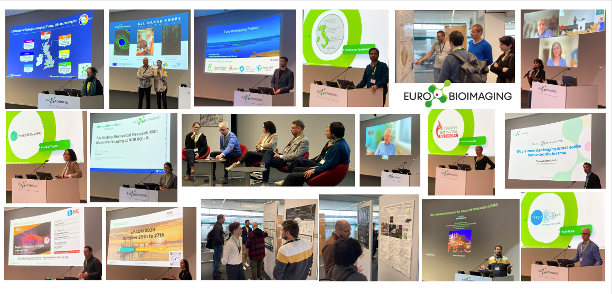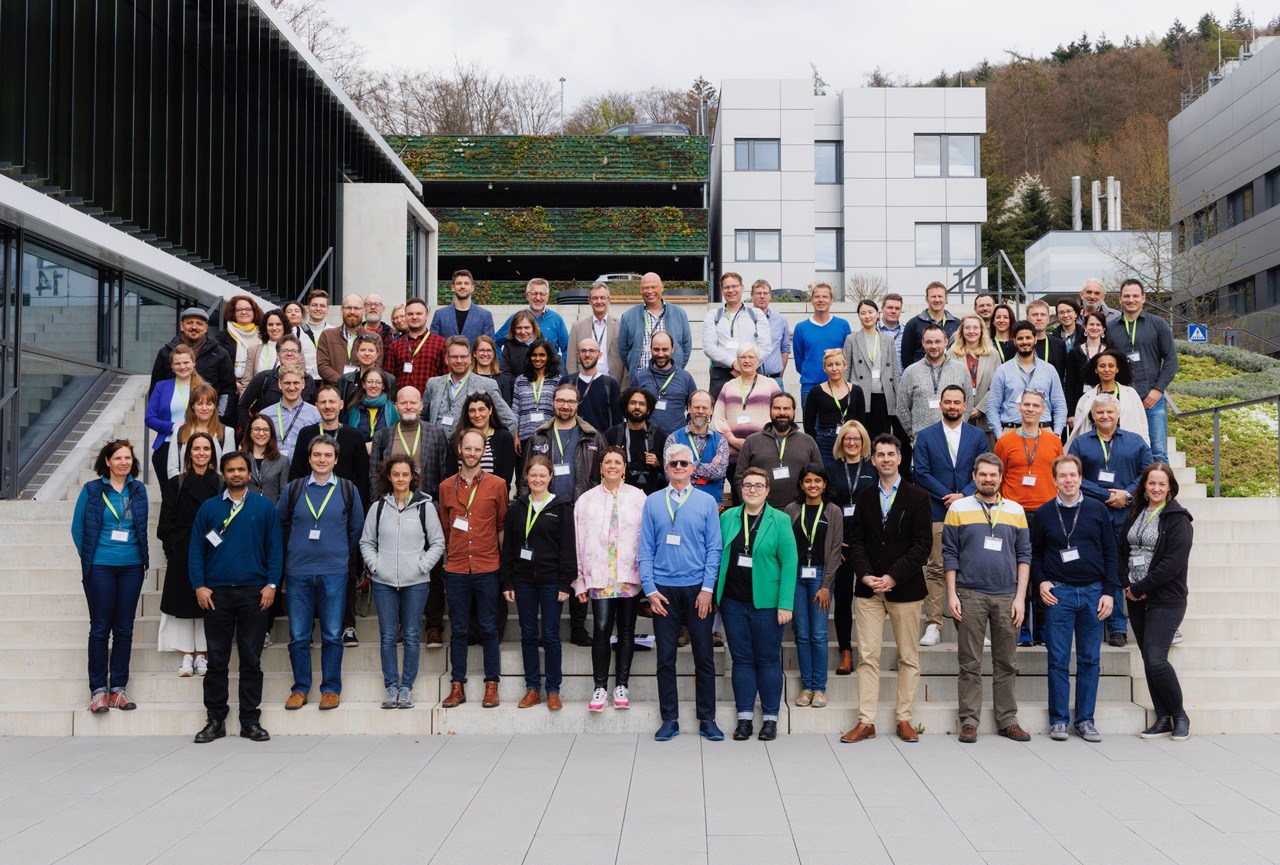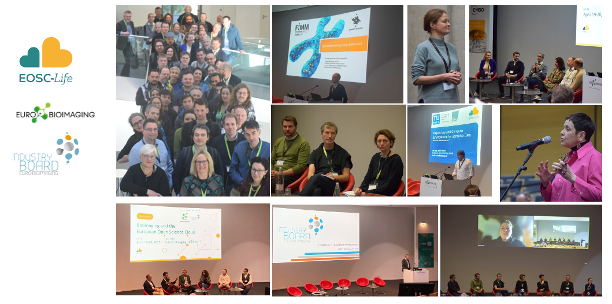All Hands Nodes Meeting 2023 & more
Published: 2023-04-24
What a busy week it was! We welcomed 100+ Node staff, data specialists and industry partners to EMBL Heidelberg for a series of science, imaging technology & data-focused events. Read about presentations and discussion topics and check out our favorite pictures from the week below.
The event started with a session on Correlative Imaging, supported by iNEXT-Discovery, on Monday, April 17th, featuring a fantastic keynote lecture from Gaia Pigino of the Human Technopole Italy. She explained how millisecond CLEM & cryo-Electron Tomography can be used to better understand the structure and dynamics of cilia beating. The talk was followed by tours of EMBL Heidelberg’s imaging core facilities as well as the Leica Innovation Centre and the EMBL Imaging Centre. Thanks to the tour guides who shared the latest technologies & highlighted the workflows and possibilities for external user access at EMBL core facilities.

Highlights from the iNext Discovery satellite session
After the visits we gathered in the auditorium for a series of talks from Euro-BioImaging Nodes on Correlative Imaging. Highlights included a presentation on MOMIX, for correlative and multimodal optical microscopy image correlation sensing from Italian ALM Node and a prototype workflow for high-resolution correlative multimodal imaging of mouse and human brains spanning multiple countries from University of Gothenburg. These talks were followed by a talk on image analysis tools for correlative multimodal images from France BioImaging, a presentation explaining a workflow in resin vCLEM to target autofluorescent cells in heterogeneous plankton populations featuring FIB-SEM from the EMBL Node, and a talk from Portuguese Brain Imaging Network (BIN) that showed us what a “Eureka moment” looks like in the brain.
On Tuesday morning, the #AllHands2023 meeting resumed with a Welcome from the Panel of Nodes Chairs, Marc van Zandvoort and Julia Fernandez-Rodriguez. Then, Euro-BioImaging Bio-Hub Director Antje Keppler presented some of the latest news & opportunities from Euro-BioImaging, and Director General John Eriksson presented the strategic outset for our organisation. In the future, we will continue to capitalise on our greatest assets - including our vibrant Node community - to build our technological expertise & increase our impact.

Highlights from the #AllHands2023 Nodes Meeting
Next we had the pleasure of hearing short “Get to Know our Nodes” presentations from seven of our Node coordinators. From technological expertise & developments to project management, training, conferences & strategic plans, we enjoyed learning more about our UK Node, Finnish BioImaging, NORMOLIM Node, The Van Leeuwenhoek Center for Advanced Microscopy (LCAM), Austrian BioImaging, Portuguese Platform of BioImaging (PPBI), and the Advanced Light and Electron Microscopy Node Prague. A number of Nodes also prepared posters to share their most recent developments.
The afternoon kicked off with a Panel discussion on Funding for national imaging communities. Five Nodes presented their funding situation, from receiving roadmap status and funding, and shared tips and insights on how to talk and lobby with national funders and build and maintain strong momentum for infrastructure funding.
Then it was time for break-out sessions on Training, Building Connections across Nodes and FAIR data. Lots of ideas were explored, in particular that of creating an expert group on training, which will be implemented soon. The afternoon wrapped up with a presentation from our partner data-driven infrastructure, ELIXIR, on opportunities for working together to address common challenges around increasingly data-intensive research. We concluded the day with a nice talk on the African Bioimaging Consortium (ABIC) and the Africa Microscopy Initiative (AMI), leading to great discussions on how the Euro-BioImaging community can support these initiatives.

#AllHands2023 Nodes Meeting Group photo
On Wednesday morning we split into three parallel breakout sessions, one of which provided the perfect transition to the “BioImaging and European Open Science Cloud (EOSC)” event hosted in collaboration with the Euro-BioImaging Industry Board and supported by the EOSC-Life project. In the first session, several Euro-BioImaging Nodes shared insights into their capacities for offering image data analysis services to users and the workflows and pipelines they support. Other breakout sessions focussed on improving user access and on keeping up with the latest technology trends.
Then we moved on to FAIR data, a topic that is of crucial importance to Euro-BioImaging, the EOSC community as well as our industry partners. Herbert Schaden of ZEISS and chair of the Euro-BioImaging Industry Board explored the topic of why keeping in control of the ever increasing amount of imaging data is important for quality research and of high interest for industry. His talk was followed by presentations from different organizations supporting the road towards FAIRification. The talks were followed by a panel discussion with academia and industry on how to facilitate FAIR data generation.
In the next session, speakers from the Euro-BioImaging Nodes and industry presented challenges & solutions for research data management at core facilities. Martin Tewinkel, EVIDENT Olympus & Industry Board Co-Chair, explored challenges from his perspective on (big) data management.

Highlights from the BioImaging and European Open Science Cloud meeting
The next session was dedicated to the European Open Science Cloud, with talks from Ilaria Nardello of the EOSC Association, and presentations on specific Open Science developments that image analysts can use to make it easier to take their data & metadata to the cloud. These tools include the BAND virtual desktop, OME.Zarr and other next generation file formats (NGFF), as well Galaxy Imaging Flavour and other developments to link the user with different data (analysis) resources. Industry partners also shared some of their big data tools and developments. The day closed with a great panel discussion on how to bring image analysis tools into the cloud and connect to EOSC.
On Thursday, April 20, the day opened with use cases from EOSC-Life, sharing the good news about different cloud-based solutions and tools developed with funding from the project, showing success stories from EOSC-Life open calls, and highlighting perspectives and goals in other running EC projects that bring Imaging datasets to the European Open Science Cloud (EOSC).The concluding panel discussion highlighted the efforts made on the level of the scientific community and policy makers to implement EOSC and explored long-term sustainability perspectives.
We were so happy to spend these days with representatives from our Nodes, FAIR data and open science enthusiasts, EOSC and EOSC-Life partners and industry board members, and Open Access journal representatives. Thanks to all of the speakers, chair people and attendees for making this a lively event with lots of fruitful discussions, and to the Euro-BioImaging Bio-Hub for the organization. Looking forward to seeing everyone in Torino next Spring!